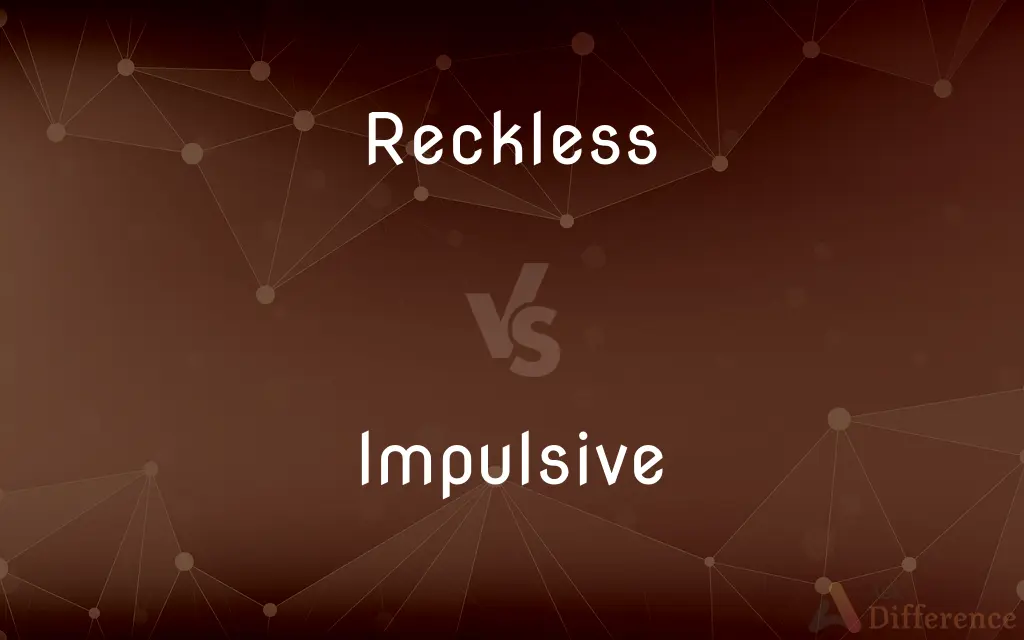Reckless vs. Impulsive — What's the Difference?
Edited by Tayyaba Rehman — By Fiza Rafique — Published on November 12, 2023
Reckless implies heedlessly taking risks, while Impulsive denotes acting without forethought. Both indicate a lack of caution but differ in intent and awareness.

Difference Between Reckless and Impulsive
Table of Contents
ADVERTISEMENT
Key Differences
Reckless is a term that indicates a bold disregard for potential consequences or dangers. When someone is Reckless, they are often aware of the risks associated with their actions but choose to proceed despite them.
Impulsive, on the other hand, is characterized by sudden actions without thorough thinking or consideration of outcomes. It's not always associated with risks like Reckless behavior, but more with spontaneity and lack of planning.
Being Reckless can be seen as a more deliberate choice to ignore risks, whereas being Impulsive might not involve any awareness of potential dangers at all. A Reckless driver might speed through a crowded area knowing the risk, while an Impulsive shopper might buy something without considering if they can afford it.
Reckless actions are usually taken with a certain level of awareness about the potential aftermath. The individual might know the dangers but chooses to act regardless. In contrast, Impulsive decisions are often taken in the heat of the moment, without any reflection on potential outcomes.
While both Reckless and Impulsive behaviors can lead to undesirable outcomes, their root causes differ. Recklessness is rooted in a conscious choice to ignore potential harm, while impulsiveness stems from an innate tendency to act without thinking.
ADVERTISEMENT
Comparison Chart
Awareness of Consequences
Often aware but disregards them
Might act without any awareness
Basis
Deliberate choice to ignore risks
Sudden actions without thorough thinking
Intention
Intentionally takes risks
Acts spontaneously without intent of risks
Root Cause
Conscious choice
Innate tendency to act without forethought
Outcome Consideration
Might consider but chooses to act despite potential harm
Rarely considers the outcomes before acting
Compare with Definitions
Reckless
Reckless indicates a willful disregard for safety.
Driving without a seatbelt is Reckless behavior.
Impulsive
Impulsive individuals often act based on immediate feelings or desires.
Feeling sad, she Impulsively ate an entire cake.
Reckless
Recklessness involves a conscious choice to overlook potential dangers.
He made a Reckless decision to go swimming during a storm.
Impulsive
Impulsiveness doesn't always consider the consequences.
In an Impulsive moment, he booked a flight to a random destination.
Reckless
Reckless behaviors are often bold and can endanger oneself or others.
Ignoring safety protocols at a construction site is Reckless.
Impulsive
Impulsiveness is marked by rapid actions without forethought.
Without thinking, he Impulsively shouted out the answer.
Reckless
Reckless individuals knowingly take chances.
Climbing without proper equipment is a Reckless endeavor.
Impulsive
Inclined to act on impulse rather than thought.
Reckless
Reckless actions are taken despite understanding the risks.
She knew the ice was thin but Recklessly walked on it.
Impulsive
Motivated by or resulting from impulse
Such impulsive acts as hugging strangers.
Impulsive generosity.
Reckless
Acting or done with a lack of care or caution; careless or irresponsible.
Impulsive
Having force or power to impel or incite; forceful.
Reckless
Careless or heedless; headstrong or rash.
Impulsive
(Physics) Acting within brief time intervals. Used especially of a force.
Reckless
Indifferent or oblivious to danger or the consequences thereof.
Impulsive
Having the power of driving or impelling; giving an impulse; moving; impellent.
Reckless
Inattentive to duty; careless; neglectful; indifferent.
Impulsive
Actuated by impulse or by transient feelings; inclined to make rapid decisions without due consideration.
Reckless
Rashly negligent; utterly careless or heedless.
It made the king as reckless as them diligent.
Impulsive
(mechanics) Acting momentarily, or by impulse; not continuous – said of forces.
Reckless
Marked by unthinking boldness; with defiant disregard for danger or consequences;
Foolhardy enough to try to seize the gun from the hijacker
Became the fiercest and most reckless of partisans
A reckless driver
A rash attempt to climb the World Trade Center
Impulsive
That which impels or gives an impulse; an impelling agent.
Reckless
Characterized by careless unconcerned;
The heedless generosity and the spasmodic extravagance of persons used to large fortunes
Reckless squandering of public funds
Impulsive
One whose behaviour or personality is characterized by being impulsive.
Impulsive
Having the power of driving or impelling; giving an impulse; moving; impellent.
Poor men! poor papers! We and theyDo some impulsive force obey.
Impulsive
Actuated by impulse or by transient feelings.
My heart, impulsive and wayward.
Impulsive
Acting momentarily, or by impulse; not continuous; - said of forces.
Impulsive
That which impels or gives an impulse; an impelling agent.
Impulsive
Proceeding from natural feeling or impulse without external stimulus;
An impulsive gesture of affection
Impulsive
Without forethought;
Letting him borrow her car was an impulsive act that she immediately regretted
Impulsive
Having the power of driving or impelling;
A driving personal ambition
The driving force was his innate enthusiasm
An impulsive force
Impulsive
Determined by chance or impulse or whim rather than by necessity or reason;
A capricious refusal
Authoritarian rulers are frequently capricious
The victim of whimsical persecutions
Impulsive
Characterized by undue haste and lack of thought or deliberation;
A hotheaded decision
Liable to such impulsive acts as hugging strangers
An impetuous display of spending and gambling
Madcap escapades
Impulsive
Impulsive signifies acting on sudden urges without reflection.
Buying a car on a whim is an Impulsive decision.
Impulsive
Impulsive behaviors are spontaneous, often without consideration.
She made an Impulsive choice to adopt a puppy without preparing her home.
Common Curiosities
Can an action be both Reckless and Impulsive?
Yes, an action can be both if done spontaneously without thought and knowingly disregards risks.
Is being Reckless the same as being Impulsive?
No, while both lack caution, Reckless is about knowingly taking risks, and Impulsive is about acting without forethought.
Are Reckless individuals always aware of the risks?
Often, yes. They might be aware but choose to act despite the risks.
Which is more deliberate, Reckless or Impulsive behavior?
Reckless behavior is more deliberate as it often involves a choice to ignore known risks.
Can someone be naturally more Impulsive or Reckless?
Yes, some people have a natural tendency towards Impulsive behaviors, while others might be more prone to take known risks, making them more Reckless.
What does Reckless mean?
Reckless indicates a bold disregard for potential consequences or dangers.
Why might someone act Impulsively?
Factors like emotions, immediate desires, or certain personality traits can lead to Impulsive actions.
Can training or therapy help reduce Impulsive or Reckless behaviors?
Yes, with proper guidance and self-awareness, individuals can learn to manage or reduce such behaviors.
What does Impulsive mean?
Impulsive denotes acting suddenly without thorough thinking or consideration of outcomes.
Do Impulsive people always act without thinking?
Typically, yes. Impulsiveness involves acting on immediate feelings or urges without reflection.
Is buying something without checking the price Reckless or Impulsive?
It's typically Impulsive, as it's a sudden action without consideration. However, if one knows they can't afford it and still buys, it could be Reckless too.
Why might someone act Recklessly?
Various reasons, including seeking thrill, peer pressure, or even personal beliefs.
Does being Impulsive always lead to negative outcomes?
Not always. While impulsiveness can lead to undesirable outcomes, sometimes it might result in unexpected positive results.
Can Reckless behavior be seen as brave?
While some might see it as brave, Reckless behavior typically involves unnecessary risks that can endanger oneself or others.
Are there medical conditions associated with increased Reckless or Impulsive behavior?
Yes, conditions like ADHD, certain personality disorders, or the effects of substances can increase Impulsive or Reckless behaviors.
Share Your Discovery

Previous Comparison
Goose Bumps vs. Goose Pimples
Next Comparison
Pumpkin vs. Pumpkin PureeAuthor Spotlight
Written by
Fiza RafiqueFiza Rafique is a skilled content writer at AskDifference.com, where she meticulously refines and enhances written pieces. Drawing from her vast editorial expertise, Fiza ensures clarity, accuracy, and precision in every article. Passionate about language, she continually seeks to elevate the quality of content for readers worldwide.
Edited by
Tayyaba RehmanTayyaba Rehman is a distinguished writer, currently serving as a primary contributor to askdifference.com. As a researcher in semantics and etymology, Tayyaba's passion for the complexity of languages and their distinctions has found a perfect home on the platform. Tayyaba delves into the intricacies of language, distinguishing between commonly confused words and phrases, thereby providing clarity for readers worldwide.












































